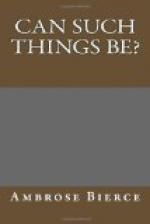I seated myself at the root of a great tree, seriously to consider what it were best to do. That I was mad I could no longer doubt, yet recognized a ground of doubt in the conviction. Of fever I had no trace. I had, withal, a sense of exhilaration and vigor altogether unknown to me—a feeling of mental and physical exaltation. My senses seemed all alert; I could feel the air as a ponderous substance; I could hear the silence.
A great root of the giant tree against whose trunk I leaned as I sat held inclosed in its grasp a slab of stone, a part of which protruded into a recess formed by another root. The stone was thus partly protected from the weather, though greatly decomposed. Its edges were worn round, its corners eaten away, its surface deeply furrowed and scaled. Glittering particles of mica were visible in the earth about it—vestiges of its decomposition. This stone had apparently marked the grave out of which the tree had sprung ages ago. The tree’s exacting roots had robbed the grave and made the stone a prisoner.
A sudden wind pushed some dry leaves and twigs from the uppermost face of the stone; I saw the low-relief letters of an inscription and bent to read it. God in Heaven! My name in full!—the date of my birth!—the date of my death!
A level shaft of light illuminated the whole side of the tree as I sprang to my feet in terror. The sun was rising in the rosy east. I stood between the tree and his broad red disk—no shadow darkened the trunk!
A chorus of howling wolves saluted the dawn. I saw them sitting on their haunches, singly and in groups, on the summits of irregular mounds and tumuli filling a half of my desert prospect and extending to the horizon. And then I knew that these were ruins of the ancient and famous city of Carcosa.
Such are the facts imparted to the medium Bayrolles by the spirit Hoseib Alar Robardin.
THE STRANGER
A man stepped out of the darkness into the little illuminated circle about our failing campfire and seated himself upon a rock.
“You are not the first to explore this region,” he said, gravely.
Nobody controverted his statement; he was himself proof of its truth, for he was not of our party and must have been somewhere near when we camped. Moreover, he must have companions not far away; it was not a place where one would be living or traveling alone. For more than a week we had seen, besides ourselves and our animals, only such living things as rattlesnakes and horned toads. In an Arizona desert one does not long coexist with only such creatures as these: one must have pack animals, supplies, arms—“an outfit.” And all these imply comrades. It was perhaps a doubt as to what manner of men this unceremonious stranger’s comrades might be, together with something in his words interpretable as a challenge, that caused every man of our half-dozen “gentlemen adventurers” to rise to a sitting posture and lay his hand upon a weapon—an act signifying, in that time and place, a policy of expectation. The stranger gave the matter no attention and began again to speak in the same deliberate, uninflected monotone in which he had delivered his first sentence:




